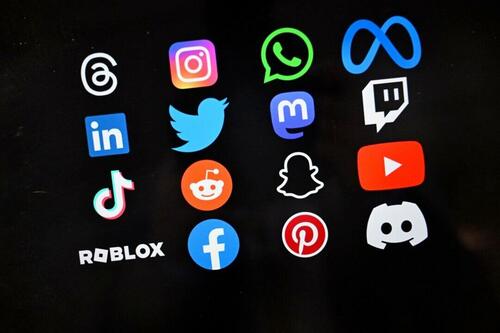Authored by Monica O'Shea via The Epoch Times (emphasis ours),
Late into the night on Nov. 28, the Australian Senate passed a “world first” law that bans under 16-year-old children from accessing social media.
The new law, once in effect, means young Australians will be barred from accessing platforms like TikTok, Facebook, Instagram, Snapchat, Reddit, and X—age verification technology will be implemented by the Big Tech firms to ensure compliance.

Certain social media programs will be allowed, including YouTube and educational apps.
The centre-left Labor government achieved passage of the Bill with support from the centre-right Liberal-National Coalition amid a blitz of Bills on the last sitting day of Parliament in 2024.
The ban passed the lower house a day earlier.
Keeping Phones From Kids Unrealistic: Senator
Liberal Senator Dave Sharma speaking in the Senate on Nov. 28, argued that parents need assistance managing social media for children.
“I think parents need help with this, and this is why I think there is a case for government intervention,” he said.
“Partly because parents have to grapple with the ubiquity of phones and electronic devices, and the crude measure that some suggest—which is take away your kid’s phone, or give them a non-smartphone without adding any apps—I don’t think is particularly realistic,” Sharma said.
“I think in today’s era we expect our children to be able to be contacted and be contactable, and this is especially true in situations in many households today where both parents are working, and they are often not home when the children might be home or coming home from school.”
Sharma added he did not discount that there were some benefits to children using social media, providing a way for them to stay in touch and stay connected.
“We all saw this during the COVID pandemic, when our children weren’t going to school and they stayed in touch through messaging platforms, through social media platforms, and it allows them to build and maintain a social circle,” he said.
“I also appreciate that the people who are isolated geographically or socially or otherwise, it provides them a way to build a community which might not be available to them in the real world.
Greens Oppose
Greens Senator David Shoebridge, however, described the bill as “deeply flawed” and was a proposal that appeared to come from people who have “never been on the internet.”
“It’s a bill to appease [media mogul] Rupert Murdoch,” he claimed.
Shoebridge also described the short Senate inquiry into the legislation as a “sham” and said the evidence against a social media ban was “overwhelming.”
Labor Minister Jenny McAllister noted the law would not come into force for a year, emphasising that keeping “Australians safe online” was a top priority of the government.
“Through extensive consultation and with the input of states and territories, the government is agreeing that until a child turns 16, the social media environment as it stands is not age-appropriate for them,” the speech said (pdf).
“Critically, this legislation will allow for a twelve-month implementation period—to ensure this novel and world-leading reform can take effect with the care and consideration Australian’s rightly expect.”
What Social Media Companies Will Be Impacted?
The Online Safety Amendment (Social Media Minimum Age) Bill 2024, which will come into force within a year, will require social media platforms to take “reasonable steps” to stop Australian children from holding an account.
“The penalty amounts are intentionally large, which reflects the significance of the harms the Bill is intended to safeguard against,” the government said in its explanatory memorandum (pdf).
“It will also strongly signal the expectation that age-restricted social media platforms treat the minimum age obligation seriously.”
Companies that do not comply face fines of up to $49.5 million (US$32 million).
Social media platforms will also need to roll out technology to verify the minimum age of users.
“The Bill does not dictate how platforms must comply with the minimum age obligation,” the explanatory memorandum states.
“However, it is expected that at a minimum, the obligation will require platforms to implement some form of age assurance as a means of identifying whether a prospective or existing account holder is an Australian child under the age of 16 years.”
X Corporation’s Concerns With Legislation
X Corporation raised concerns about the legality of the legislation and failure to incentivise parents, in a submission to the Senate Environment and Communications Legislation Committee.
“We have serious concerns as to the lawfulness of the Bill, including its compatibility with other regulations and laws, including international human rights treaties to which Australia is a signatory, as further detailed below,” X said in a submission (pdf).
“By design, the Bill ignores the realities of the wider technology ecosystem and goes as far as to exclude entire industries and parts of society, including parents and caregivers, all of whom should be motivated and supported to work together to keep young Australians safe online.”
Billionaire Elon Musk also weighed into the debate on the social media ban personally on Nov. 21, responding to a post from Prime Minister Anthony Albanese touting the ban.
“Seems like a backdoor way to control access to the Internet by all Australians,” Musk posted to X, in reference to the possible rollout of a national ID or age verification technology.
Catholic School Parents in Favour
The Senate Committee also heard views in favour of the bill, with the New South Wales government presenting a survey of 21,000 people that showed 87 percent of people supported a minimum age standard for social media.
Catholic school parents in Western Australia also argued that social media could impact children’s behaviour.
“Parents are worried that children and young people are becoming desensitised to some of the content that they are seeing, and that it is leading to a distorted understanding of some serious topics,” the advocacy group told the inquiry.